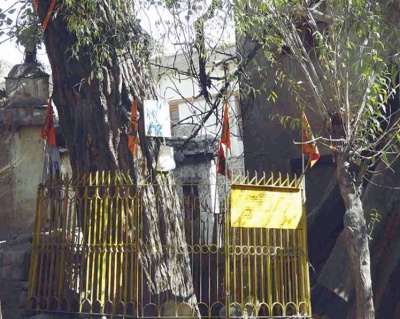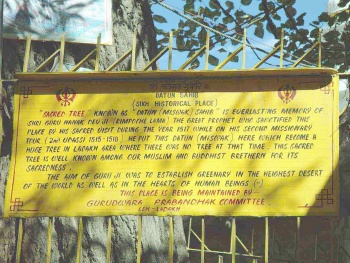Datun Sahib: Difference between revisions
(New page: thumb|400px|center In Leh city there is a biggest and oldest tree planted by Guru Nanak Dev ji. It is located in the main bazar at the back sid...) |
mNo edit summary |
||
| (12 intermediate revisions by 2 users not shown) | |||
| Line 1: | Line 1: | ||
[[Image:Datun_Sahib_2_Leh_Ladhakh_copy.jpg|thumb|400px| | [[Image:Datun_Sahib_2_Leh_Ladhakh_copy.jpg|thumb|400px|right]] | ||
In Leh city | |||
[[Image:Datun_Sahib_Leh_Ladhakh.jpg|thumb| | In [[Leh|Leh City]] there is an ancient 'sacred' Datun tree, well known around the city as Datun (Miswak) Sahib, which many people believe is the biggest and oldest tree tree alive, which was actually planted by [[Guru Nanak|Guru Nanak Dev ji]] during his missionary travels or [[Guru Nanak Udasis|udasis]]. Considered to be sacred by the city's residents, regardless of their religion, the tree was the first tree to grow in the area. At the time of the Guru's visit the high desert had no trees as only small shrubs and bushes would grow at the high, arid altitude. Today the Guru's sapling has grown to be the biggest tree in the city. | ||
[[Category: | |||
Thought to have been planted by [[Guru Nanak]] on his second missionary tour (Udassi 1515-18) the venerated tree is located in the city's main bazar at the rear of its main mosque. A small board relating the history of the Guru's visit and his planting of the young neem tree has been erected on a fence, which encircles the tree. Along with the fence and signboard a Nishan Sahib has been erected by the local Sikh [[Sangat]] (community). Though the sign states that the Gurdwara Prabandak Committee of Leh-Ladak is maintaining the site, the tree itself is in need of immediate maintenance as its condition is deteriorating daily. | |||
In [[India]] the Datun, also called the [[Neem]] tree, has often been referred to as the 'village pharmacy'; its antibiotic and germ killing abilities have long been known in [[Ayurvedic]] medicine. The people of India have long revered the tree, as daily millions use neem twigs to clean their teeth. One of India's richest men has built a fortune in no small part on his business which uses the tree's sap as a natural insecticide for Agricultural use. | |||
[[Image:Datun_Sahib_Leh_Ladhakh.jpg|thumb|350px|right|Click to enlarge]] | |||
<blockquote> | |||
<center><br> | |||
<big>'''Notice board at the site of the tree'''</big> | |||
''“Datun Sahib” ''<br> | |||
''(Sikh Historical Place)'' | |||
''“Sacred Tree” known as “Datun (Miswak) Sahib is everlasting memory of Shri Guru Nanak Dev Ji (Rimpoche Lama) the Great prophet who sanctified this place by his sacred visit during the year 1517 while on his second missionary tour (2nd Udassi 1515-1518). He put this Datun (Miswak) here which became a huge tree in Ladakh area where there was no tree at the time. This sacred tree is well known among our Muslim and Buddhist brethren for its sacredness.'' | |||
''The aim of Guru ji was to establish greenery in the highest desert of the world as well as in the hearts of human beings.'' | |||
</center> | |||
</blockquote> | |||
==See also== | |||
* [[Nanak in J & K]] | |||
* [[Nanak in Sikkim,Ladakh & Tibet]] | |||
* [[Guru Nanak Tree]] | |||
[[Category:Jammu Kashmir]] | |||
[[Category:Gurdwara in District Leh]] | |||
Latest revision as of 22:18, 7 February 2010
In Leh City there is an ancient 'sacred' Datun tree, well known around the city as Datun (Miswak) Sahib, which many people believe is the biggest and oldest tree tree alive, which was actually planted by Guru Nanak Dev ji during his missionary travels or udasis. Considered to be sacred by the city's residents, regardless of their religion, the tree was the first tree to grow in the area. At the time of the Guru's visit the high desert had no trees as only small shrubs and bushes would grow at the high, arid altitude. Today the Guru's sapling has grown to be the biggest tree in the city.
Thought to have been planted by Guru Nanak on his second missionary tour (Udassi 1515-18) the venerated tree is located in the city's main bazar at the rear of its main mosque. A small board relating the history of the Guru's visit and his planting of the young neem tree has been erected on a fence, which encircles the tree. Along with the fence and signboard a Nishan Sahib has been erected by the local Sikh Sangat (community). Though the sign states that the Gurdwara Prabandak Committee of Leh-Ladak is maintaining the site, the tree itself is in need of immediate maintenance as its condition is deteriorating daily.
In India the Datun, also called the Neem tree, has often been referred to as the 'village pharmacy'; its antibiotic and germ killing abilities have long been known in Ayurvedic medicine. The people of India have long revered the tree, as daily millions use neem twigs to clean their teeth. One of India's richest men has built a fortune in no small part on his business which uses the tree's sap as a natural insecticide for Agricultural use.
Notice board at the site of the tree
“Datun Sahib”
(Sikh Historical Place)“Sacred Tree” known as “Datun (Miswak) Sahib is everlasting memory of Shri Guru Nanak Dev Ji (Rimpoche Lama) the Great prophet who sanctified this place by his sacred visit during the year 1517 while on his second missionary tour (2nd Udassi 1515-1518). He put this Datun (Miswak) here which became a huge tree in Ladakh area where there was no tree at the time. This sacred tree is well known among our Muslim and Buddhist brethren for its sacredness.
The aim of Guru ji was to establish greenery in the highest desert of the world as well as in the hearts of human beings.


